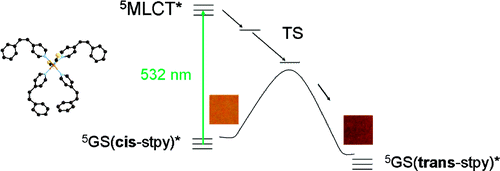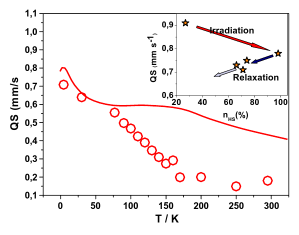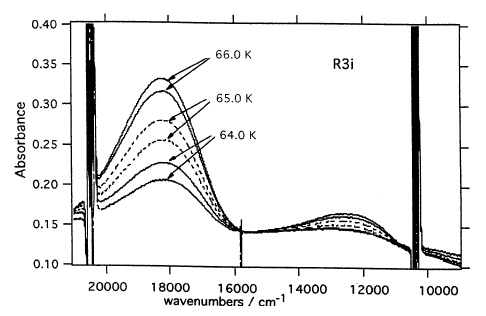
|
Photophysics and Photochemistry of Transition Metal Compounds |
| Home Research Members Collaborations Publications |

|
 |
|||||||
The photoreactivity of two iron(II)−styrylpyridine frameworks Fe(stpy)4(NCSe)2 (stpy = 4-styrylpyridine) has been investigated for the very first time in a crystalline solid. A quantitative cis-to-trans isomerization of stilbenoids is shown to occur in the confined environment of the inorganic solid. The photochromic reaction was driven by a visible excitation into the metal-to-ligand charge transfer absorption of the high-spin all-cis complex. The solid-state transformation is accompanied by a unit-cell volume increase and an amorphization. Interestingly, the photoproduct formed by irradiating the high-spin all-cis reactant undergoes a spin conversion when the temperature is decreased. This observation is related to the “ligand-driven light-induced spin change” effect in a constrained environment. | ||||||||
 |
|
|||||||
The spin-transition (1A1↔5T2) behaviour of a new mononuclear iron(II) compound [FeII(L)3][PF6]2[L = 2-[3-(2′-pyridyl)pyrazole-1-ylmethyl]pyridine] has been investigated by 57Fe Mössbauer spectroscopy. Analysis of the Mössbauer spectra revealed low value of the quadrupole splitting of the high-spin state which reflects iron(II) to be in nearly cubic lattice site. Mössbauer spectra under light show the light-induced excited spin state trapping effect and the observed quadrupole splitting of the metastable high-spin state is found little sensitive to the high-spin fraction value. DFT calculations are in progress to document the almost cubic nature of the ligand-field acting on the iron atom. | ||||||||
|
 |
|||||||
The quasi-static nature of a light induced thermal hysteresis was studied on the spin-transition compound [Fe(ptz)6](BF4)2, by means of optical spectroscopy and magnetic measurements in the temperature interval between 10 and 80 K. Various experimental procedures are discussed in relation to the competition between the two processes considered, namely the photoexitation and the high-spin→low-spin relaxation. A detailed discussion of the experimental parameters, which should be considered in order to avoid erroneous interpretations of LITH, is given. | ||||||||
Download this list in format RIS
 EndNote
EndNote  BibTex
BibTex  PDF XML
PDF XML Last update Friday December 08 2017